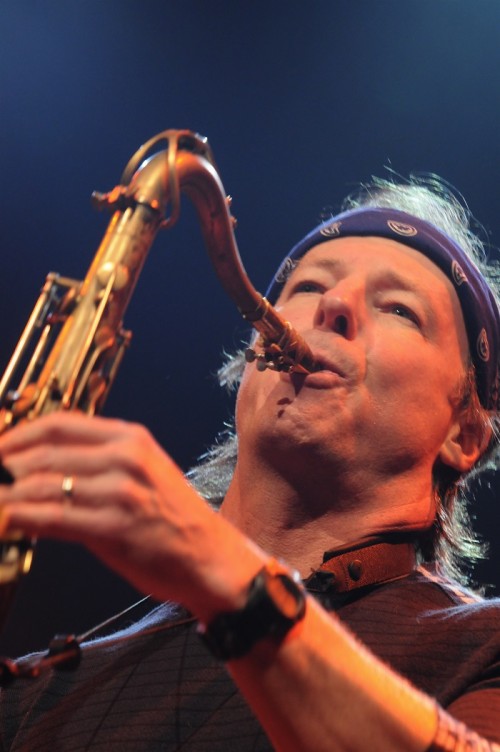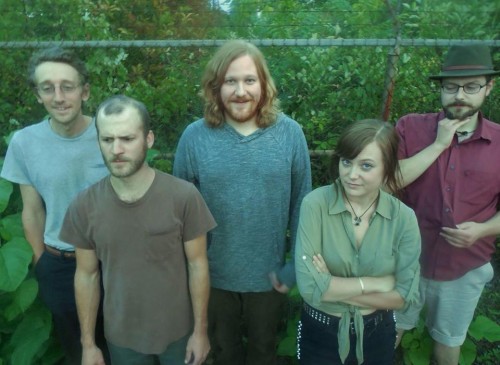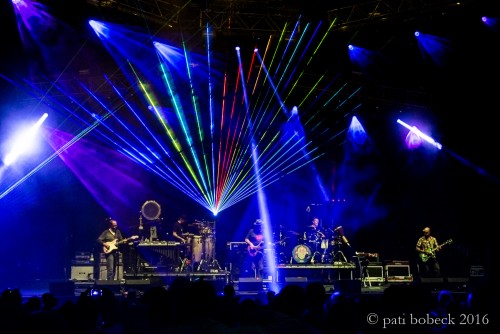It’s rare to find a musician who has risen to the top of any particular genre. Rarer still is an artist who has achieved remarkable success in two distinct styles – someone like saxophone player and musical visionary Bill Evans.
A Midwestern native, Evans rose to prominence on the jazz scene almost immediately, earning a position in Miles Davis’ band in the early 1980s as the mercurial legend was emerging from retirement. As a young man, Evans was not only tasked with holding down the sax slot in Davis’ group, but he was also instrumental in guiding Davis back into the music scene. After his time with the jazz icon came to a close, Evans went on to work with everyone from Mick Jagger to Willie Nelson and launched a prolific solo career in 1990.
Evans, now based in Westchester County, N.Y., had been focusing the majority of his touring efforts overseas, where jazz is generally a more lucrative endeavor, but the past few years have found the musician, painter and avid fisherman spending more time on stateside stages as he has become a recognizable figure on the jam band scene, lending his talents to groups like the Allman Brothers Band, Gov’t Mule and Umphrey’s McGee while simultaneously introducing his own band, Soulgrass, formed in 2005, to fans of improvisational rock music. Playing internationally, however, has remained a major thrust of Evans’ career; his schedule this summer includes dates as far afield as Monaco and The Ukraine, with possible fall shows in India, and an upcoming documentary filmed over the course of 10 of Evans’ shows in Russia by German filmmaker Christoph Felder is in the works.
The talkative and friendly sax man, who will bring Soulgrass to this weekend’s Susquehanna Breakdown festival in Scranton, Pa., recently spoke with Highway 81 Revisited about the genesis and progression of Soulgrass, how the jam band scene has proven to be a welcoming and lively home for his music, how music transcends political borders and what it was like to work alongside Miles Davis.
What was your intention when you formed Soulgrass?
My intentions were to come up with an interesting, organic blend of music that grew. With coming from my background in jazz and funk, I was really interested in including more instruments from Americana, like the fiddle and the dobro and the banjo, instruments that I really like that I never played with before, and doing it in a very soulful way. That’s the idea that first sparked when I came up with the idea of Soulgrass.
Now that you’ve followed up on those intentions, has it turned out as planned? Have you veered off that path and found other things you weren’t consciously looking for?
Oh, it’s grown tremendously, you can’t help it. And that’s the really cool thing about going into a kind of music that has no ending, because it just continues; it’s like starting a garden that continually evolves, spring, summer, fall, and every year you might add a few more things. For me, we started off with fiddle and banjo, then I went to banjo and guitar with some fiddle, and now I’m doing a temporary – well maybe not temporary, I never know – two guitars and we have a lot of vocal tunes now. We really evolved into an interesting unique sort of hybrid of music, which is a lot of fun. It grooves hard, it’s sort of soulful blues. It’s hard to put a name on it. It’s really interesting.
You’ll be playing at Susquehanna Breakdown in Scranton. You’ve played Peach Festival at that same venue. Do you have any particular memories from Peach?
Yeah, as a matter of fact, the audience was supercharged, which was really fun, and from that festival, Oteil Burbridge from the Allman Brothers sat in and played with us and I remember I sat in with the Allman Brothers later that same day, and that was a really fun hang. Since then my relationship with Gregg Allman has grown, and he recorded a tune, sang on my new record that’s coming out in the fall, and Warren Haynes is on it as well. How do you like that segue? (laughs)
Is that going to be a Soulgrass album or just under your name?
Probably under Soulgrass, but it could be my name, but I think Bill Evans Soulgrass because it’s my guys. It features Gregg Allman and Warren Haynes and J.J. Grey and Anders Osborme and Joe Russo, Marco Benevento, a whole bunch of guys.
Those fellows you mentioned segues into a question I have about you migrating over to the jam band world. How did that come about? I’ve read that Warren was the guy that kind of brought you in?
It’s interesting because I don’t create music for any genre, I just do the music that I do. I’ve been touring with my own band since 1990, mostly in other parts of the world, and when I started in 1990, I had rappers and singers, and it was sort of, if you want to think jam band, it was sort of out of that genre, but the genre didn’t exist yet. Because I’m a jazz musician that loves soul, funk and rock, and that’s sort of the genre of what I hear “jam band” coming out of. I was messing around with that in the late ’80s after I played with Herbie Hancock and John McLaughlin and Miles Davis; it was just a natural thing for me. So I continued to do that and you know play in 40 countries every year. That’s how I make my living, and occasionally I’d play in the Midwest or tour the Northeast or whatever, but I haven’t pursued any sort of genre. And then Warren invited me to sit in with the Allman Brothers about five years ago in New York, and our friendship grew from there, and then I was sitting in with Gov’t Mule on a lot of different occasions, and then it grew into this…I was sort of an extra member of these bands on occasion, you know? And then Warren co-wrote a song with me on my “Dragonfly” CD with Soulgrass, instrumentally, playing guitar, and then we co-wrote a tune for this new record, where he is singing lead vocals. My music fits into the genre, so it’s been flowing from me playing the music that I play but now with sort of the right people.
How would you compare jazz audiences to jam band audiences?
It’s interesting, because my audience was sort of mixed anyway. They were just people that liked my music, and there were people that would come up to me over the years in the States and name different bands in the jam band scene and say, “You know, you guys would be a great double bill,” or “you should play this festival because you guys would be great.” For instance, Peach Festival or Lock’n. They’d name all these festivals. I’d never heard of the festivals, doing what I do. Finally all of a sudden I got with a booking agency that said, “We know where to put you.” So now we’re in the right place because we’re in front of the right audiences, you know?
Where are you at with the new album now? Is it completed?
No. It’s almost done, probably another month. With everybody’s schedule it was really crazy because I sort of started doing it last month, then I’d go on the road and so some dates, then I’d leave, then I’d work on it again, then I’d leave. Then I had to work out schedules when Warren was going to be around, when J.J. was going to be around, when Anders was going to be in New York, and we were doing a lot of sending things through emails and tracks flying through cyberspace. It just takes time, because when you’ve got guys that are as busy as all of the guys that I use, it’s difficult. I mean Gregg, I flew down to Savannah and stayed at his house for a couple days and we did it at a studio down there, that was cool, that was more relaxed and fun; we didn’t have to rush things. And Warren came and did it at my studio at my house.
Tell us about the upcoming documentary filmed during your recent Russian tour.
We got a lot of footage. We were on the Trans Siberian Express train, we were all over Siberia, we did 10 concerts and most of the audiences were 2,000 people and up. We filmed every single show, 11 shows. We ended up at the U.S. ambassador’s residence in Moscow with a bunch of the ambassadors around the world; I gave a speech in front of them. It’s sort of a documentary to show…there’s a lot of tension between Russia and the United States at the moment. We toured all over Russia, and it’s a big, big country, and we filmed everything, from the plane to the backstage, to the towns, to Mongolia. We were there for 17 days, going, going constantly, filming constantly. It’s something to show people around the world what it’s like inside and what these people are like. We’d sign autographs and sign pictures for an hour or so every night after the gigs, and these people are people; music transcends politics, it transcends religion. The people that are over there are only watching state-run TV from Moscow, which doesn’t say many good things about Americans, it’s a very slanted view. Well, we show up and we tell these people, “Hey, listen, we’re all the same.” And they’re smiling and they’re grooving. It just shows that we were kind of the jazz ambassadors, music ambassadors, while we were there, and that’s what we kind of want to show in the video and get it on Sunday morning TV or something. Just kind of do a thing and shine a light on something that I thought might be a good thing to do.
Obviously a lot has been said and written about Miles Davis over the years but you actually worked very closely with him. What was your experience with him and how was your relationship?
Well, if you have a few weeks I could tell you. I’ll give you the short version: we were really good friends. He was coming out of retirement so we really connected as friends and I went into the studio with him when I first met him, and then he really didn’t do any touring for a year. I got to know him and we went in and out of the studio, and in short I helped put the band together that became the touring band a year later, which was 1981, with Marcus Miller and Mike Stern first and then John Scofield. I was sort of his conduit to what was happening on the music scene, so I sort of helped him through that whole period. So it was a very unique time for me, because I was in my early 20s, helping Miles Davis back into the music world, and it was a very interesting time; it was a great time. And he was a very personable, funny genius, and I learned a ton from him, and it sort of gave me the confidence to spin off from that and do my own band have the confidence to do things like Soulgrass, things I heard in my head. He said that’s what you do; the things that you’re inspired to do, you do, and you don’t second guess yourself. And I sort of haven’t looked back since.
I assume it helped your career to have tenure with Miles Davis on your resume.
Of course, there’s no way it could not. But once you’re in, you’re the one who has to perform. No one can make you play a certain way. Someone can put you in the field and tell you to run, but you’re the one who has to run. It’s not a sure thing for anyone. It just gives you the opportunity, and if you know how to use it you can do something with it.




Leave a Reply